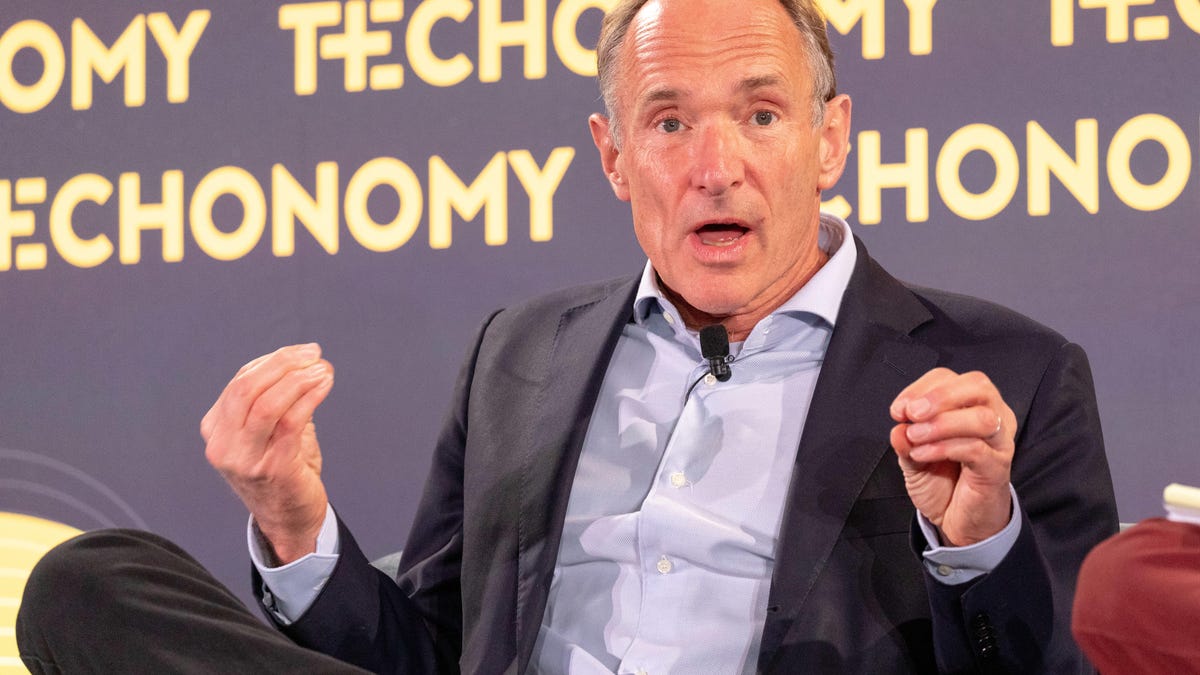Web creator Berners-Lee hopes you'll take control of your data in 2019
The adventurous at least should be able to try the technology from Tim Berners-Lee's startup, Inrupt, in coming months.

Web creator Tim Berners-Lee speaks at the Techonomy 2018 conference in Half Moon Bay, California.
If you're tired of companies hoarding all kinds of personal data about you, you could be able to try an alternative approach next year from Inrupt, the startup from web creator Tim Berners-Lee.
Inrupt is backing an open-source project called Solid that's designed to let us keep control over our own data instead of leaving it in the data centers of companies like Facebook and Google. You store the data in your own "pod," and those companies get access only when you grant permission.
It's available for developers right now, but Berners-Lee said he hopes ordinary folks will be able to give it a shot next year.
"We might start with early-adopter communities," Berners-Lee said at the Techonomy conference in Half Moon Bay on Sunday. One possibility is journalists, who often have sensitivite data. "They could set their own Solid pods in a privacy-respecting place like Berlin," he said.
Berners-Lee's vision is a profound rewrite of how business online works, and embracing the view won't be easy. Even if people are eager to spend time managing data-sharing details, the technology won't work unless companies sign up for the vision, too. But there are signs that trend are pushing that direction as people install browsers or browser extensions that block behavior tracking and Europe's General Data Protection Regulation (GDPR) is forcing companies to offer some consumer controls.
Inrupt skeptics
At the conference, Berners-Lee encountered some skepticism. One audience member asked how Solid ensures consumers really have control over data when companies need to have it on their own systems to actually get some work done. Another asked where the boundary is between personal data and company data, given that companies really need data to operate.
Berners-Lee acknowledges there's a gray area. Companies, though, need to be conscious of the boundary, at least in Europe, because of the GDPR that requires among other things that individuals may get a copy of the data those companies have on them.
Some data will be kept in sync between companies and individuals, he added. A bank needs to store account information at the bank, but a individual's copy of it would be updated when a transaction occurs.
"We don't like talking about 'owning' your data. We prefer 'control.' It's not like oil -- when you sell it, somebody else burns it and you don't," Berners-Lee said.
Taking dystopia out of the web
For Berners-Lee, the issue is personal. He's remained active as a steward of the World Wide Web he invented in 1989 through groups like the World Wide Web Consortium and Web Foundation. One recent effort there is the web contract he's helping to design in an effort to make the web more trustworthy and less susceptible to some of today's dystopian problems.
"It was fine until a couple years ago," he said. But now, "there's a bunch of junk out there. There's lots of nasty stuff out there. The utopia has curved to what a lot of people out there on the street think is a pretty dystopian web."
He encouraged people to participate in creating the web contract.
"Some of these things will be easy like freedom! Bandwidth! Some will be tricky like 'no hate speech,' but 'freedom of speech,'" he said. But the web is made by humans, and he believes we can steer its future.
"It was really hard to get some people to believe climate change is anthropogenic," Berners-Lee said. "Some people forget that social networks are anthropogenic."
Fight the Power: Take a look at who's transforming the way we think about energy.
'Hello, humans': Google's Duplex could make Assistant the most lifelike AI yet.

